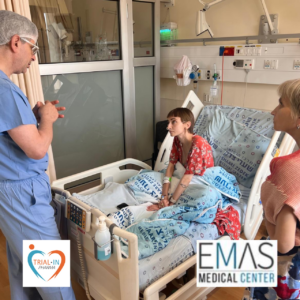Background
Lurbinectedin, a selective inhibitor of oncogenic transcription, has shown preclinical antitumor activity against homologous recombination repair-deficient (HRD) models and preliminary clinical activity in BRCA1/2 breast cancer.
Introduction
Breast cancer with BRCA1/2 mutations is emerging as a distinctive group of breast cancers that present at an earlier age with hallmarks of genomic instability and accumulation of DNA damage.
Two PARP inhibitors are available as the therapeutic option (Lynparza and Talzenna), but many patients do not derive benefit because of multiple primary and secondary resistance mechanisms and toxicities.
About Lurbinectadin
Lurbinectedin is a selective inhibitor of oncogenic transcription that leads to cell death. Lurbinectedin has antitumor activity against homologous recombination repair-deficient (HRD) cell lines.
About the Study
In a basket, open label, phase II study, nine cohorts of patients with different tumor types were treated with lurbinectedin.
Based on the results in the Small-Cell Lung Cancer (SCLC) cohort, approval of lurbinectedin was obtained in this indication first in the United States and later in other.
This article focuses on the outcomes in the germline BRCA1/2 breast cancer cohort.
This cohort was evaluated because, in a previous phase II study, lurbinectedin had shown antitumor activity in patients with advanced breast cancer and germline BRCA1/2 pathogenic variants: Response Rate was 41% and median Survival was 20.0 months compared to 9% and 12.5 months, respectively, in patients with BRCA1/2 wild-type or unknown status.
In this current phase II trial evaluated lurbinectedin in a cohort of 21 patients with pretreated germline BRCA1/2 breast cancer.
Results
28.6% of patients had their cancer lesions shrunk (also called Partial Response, PR) and these patients had received a median of two prior advanced chemotherapy lines.
Lurbinectedin was active in both BRCA mutations: four PRs in 11 patients (36.4%) with BRCA2 and two PRs in 10 patients (20.0%) with BRCA1.
47.6% had Stable Disease (SD, meaning the disease was controlled and the lesions stayed the same volume and size)
This brings us to 76.2% of patients with clinical benefit
Median Survival was 16.1 months.
Side effects
The most common treatment-related side effects were nausea, fatigue and vomiting.
These side effects were mostly mild.
The most common harsh toxicity was neutropenia.
Highlights
Lurbinectedin has previously shown antitumor activity in breast cancer patients with mutations in BRCA2.
This phase II basket study included a cohort of 21 patients with BRCA-mutated breast cancer treated with lurbinectedin.
The study showed antitumor activity and clinical benefit to BRCA-mutated patients who failed on previous treatment lines.
Talk to us so see if we can help you to actually get the most advanced treatments
TRIAL•IN Pharma
Because we, do not give up on life!
Contact us 24/7 –
Call center +44.2082.426.039
Read more about Breast cancer >>








